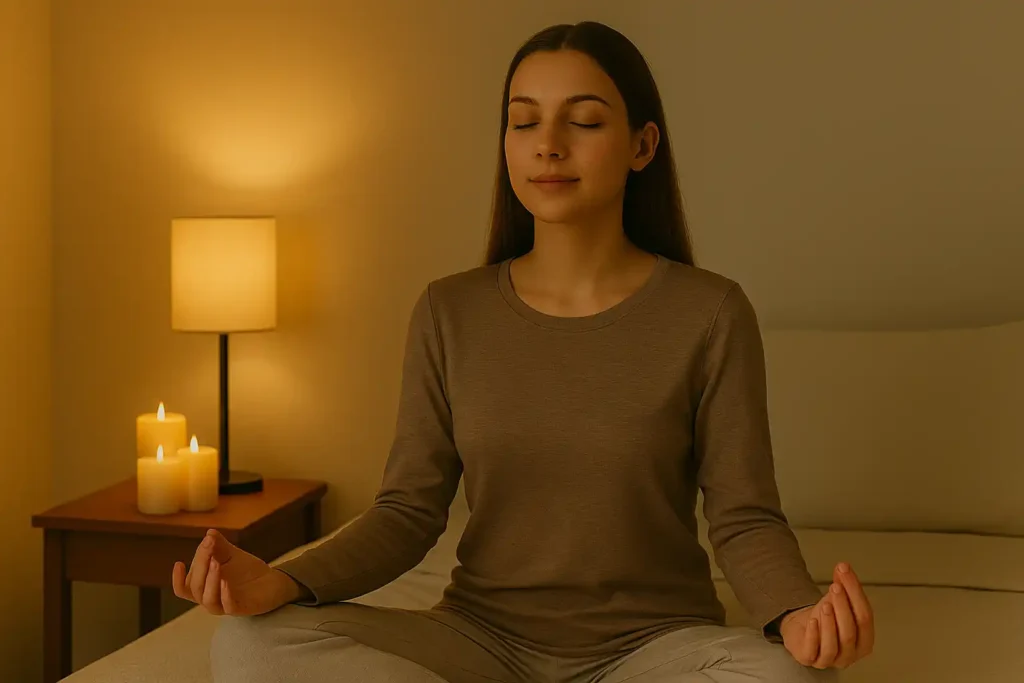

In our fast-moving world, the hours before bed often feel like a race to wrap up tasks or scroll through screens. However, carving out time for intentional evening rituals can be a game-changer for reducing stress and boosting overall well-being. These simple, purposeful practices help you unwind, reflect, and prepare for a restful night. Let’s explore why evening rituals matter and how to create ones that work for you.
Contents
Why Evening Rituals Matter
Evening rituals are intentional activities you do consistently at the end of the day to transition from busyness to calm. Unlike a rushed bedtime routine, these rituals focus on mental and emotional decompression, setting the stage for relaxation and personal growth. Research shows that structured evening habits can lower cortisol levels, improve mood, and enhance sleep quality, all of which contribute to better health.
Here’s why they’re so powerful:
- Stress Reduction: Engaging in calming activities signals your nervous system to shift from “fight or flight” to “rest and digest,” easing tension accumulated during the day.
- Mental Clarity: Evening rituals provide space to process thoughts, reducing mental clutter and fostering a sense of closure for the day.
- Improved Sleep: By creating a buffer between daily stress and bedtime, rituals help you fall asleep faster and enjoy deeper rest.
- Personal Growth: Reflective practices, like journaling or gratitude, encourage self-awareness and positivity, nurturing emotional resilience.
Ideas for Evening Rituals
Your evening ritual should feel personal and sustainable, tailored to your lifestyle and preferences. Below are some ideas to inspire you, with flexibility to mix and match:
- Reflect with Journaling: Spend 5-10 minutes writing about your day. Jot down what went well, what you learned, or any lingering thoughts. This practice can help you process emotions and let go of worries. Alternatively, try a gratitude journal, listing 2-3 things you’re thankful for to end the day on a positive note.
- Practice Gentle Movement: Engage in light stretching, yoga, or a short walk to release physical tension. Focus on slow, mindful movements to ground yourself in the present moment.
- Enjoy a Screen-Free Hobby: Swap scrolling for a calming activity like reading, knitting, or sketching. These hobbies engage your creativity without overstimulating your brain.
- Savor a Warm Drink: Sip on a caffeine-free herbal tea, like chamomile or peppermint, to create a soothing ritual. The act of slowing down to enjoy a warm beverage can be surprisingly grounding.
- Meditate or Breathe Deeply: Try a brief mindfulness meditation or deep-breathing exercise. For example, inhale for 4 counts, hold for 4, and exhale for 6 to calm your nervous system.
- Plan for Tomorrow: Spend a few minutes reviewing your schedule or writing a short to-do list. This can ease anxiety about the next day and help you feel organized.
How to Build Your Evening Ritual
Creating a ritual that sticks requires simplicity and intention. Here’s how to get started:
- Choose a Time: Dedicate 15-30 minutes in the evening, ideally 1-2 hours before bed, to focus on your ritual. This gives you enough time to unwind without feeling rushed.
- Start Small: Pick 1-2 activities that resonate with you, like journaling and a short stretch. As the habit forms, you can add more elements if desired.
- Create a Cue: Anchor your ritual to a specific trigger, like brushing your teeth or turning off work devices, to make it a natural part of your evening.
- Set the Mood: Dim the lights, play soft music, or light a candle to signal that this is your time to relax. A cozy atmosphere enhances the experience.
- Stay Consistent: Aim to practice your ritual most nights, but don’t stress if you miss a day. The goal is progress, not perfection.
Overcoming Common Challenges
Building a new habit can come with hurdles. Here’s how to address them:
- “I’m too busy”: Even 5 minutes of deep breathing or gratitude reflection can be effective. Start with something quick and build from there.
- “I get distracted”: Keep distractions like phones out of reach during your ritual. Try setting a timer to stay focused.
- “It feels awkward”: It’s normal for new practices to feel unfamiliar. Experiment with different activities until you find ones that feel authentic to you.
Aligning with Your Needs
Your evening ritual should evolve with your lifestyle. For example, if you’ve mentioned an interest in stress relief (as you’ve hinted in past conversations about sleep-related topics), focus on rituals like meditation or journaling to address mental tension. If you’re drawn to structure, incorporate planning or list-making to feel in control. The key is to make it yours.
When to Seek Support
If stress or overwhelm persists despite your evening rituals, consider speaking with a counselor or therapist. They can offer tailored strategies to complement your habits and address deeper concerns.
Final Thoughts
Evening rituals are a small but mighty way to reclaim your evenings and nurture your well-being. By setting aside time to unwind and reflect, you create a space for calm in a hectic world. Start tonight with one simple practice—whether it’s a cup of tea or a moment of gratitude—and see how it transforms your evenings. Here’s to ending your days with peace and purpose.
Author Details




Medical content by qualified psychiatrists
Our editorial policy

Zopiclone precautions Read our potential abuse notice

Looking for a seller? Locate the best Zopiclone vendor






